
Naturally different
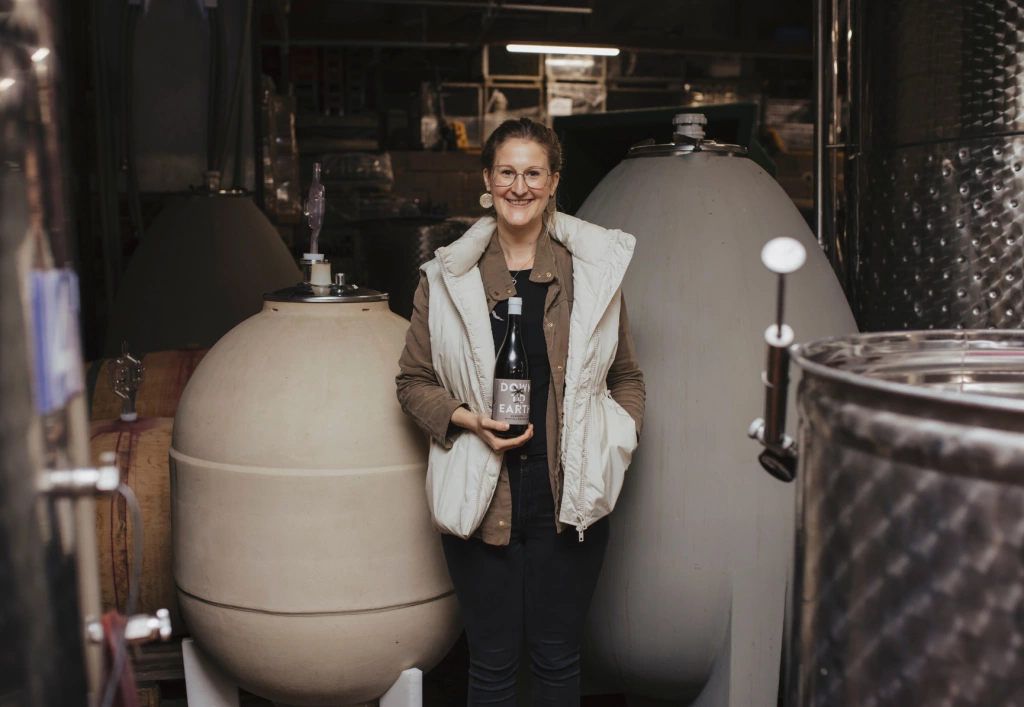
As a young visionary winemaker, Michaela Riedmüller from Hainburg an der Donau in the Austrian wine region of Carnuntum bottled her first natural wine back in 2016 – long before the hype. Today, the 'Down to Earth' series comprises seven wines that express the special terroir of Braunsberg with the characteristic salinity and minerality of its granite soil. The range offers an exciting variety that reflects the international zeitgeist. Curious? Then you should definitely get to know Michaela Riedmüller and her wines!
It grows on a barren dry grassland, exposed to wind and weather, but produces a delicate flower despite the harsh conditions. "For me, the Feathered Pink (Dianthus plumarius) stands for a delicate lightness, for the beauty of nature", says the young winegrower Michaela Riedmüller. There is passion in her voice. Not only for the flower that prominently adorns Riedmüller's labels, but also for the place where it grows.
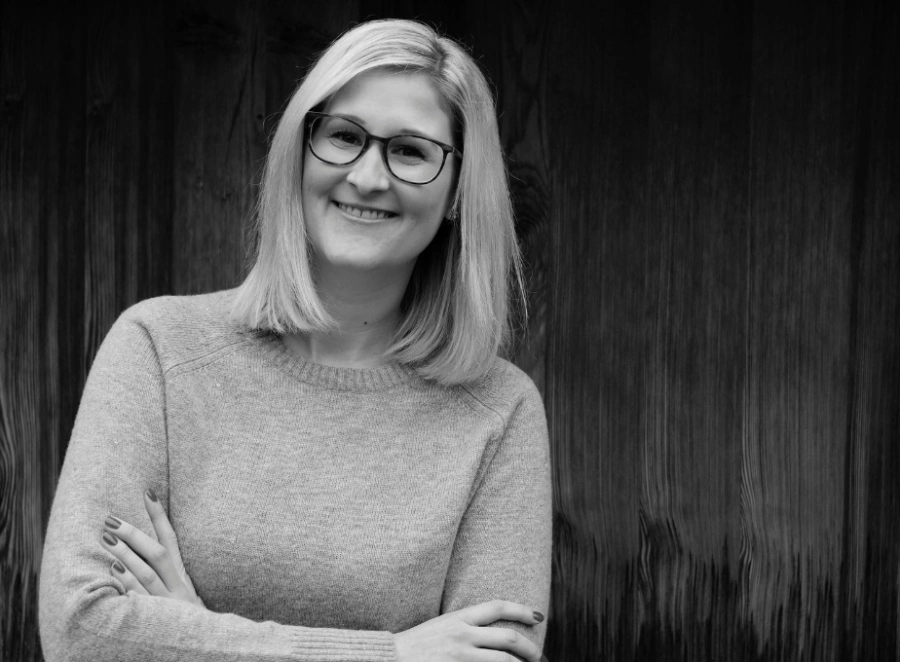
Michaela Riedmüller has been exploring the Braunsberg and the surrounding nature reserves since she was a child. Guided by a thirst for adventure and a love of nature, her heart beat for viticulture from an early age. "There was no Plan B, being a winemaker was always my dream job," she recalls. At the age of just 19, she took over her parents' business. Today, Riedmüller cultivates eight hectares spread across the top sites of Spitzerberg and Braunsberg, two of what she describes as the "most exciting in Carnuntum", and in both foothills of the Little Carpathians.
Unique selling point
Here, in the easternmost corner of Austria, right by the Danube and just a stone's throw from the Slovakian border, Michaela Riedmüller makes wines with strong character and a profound sense of origin. "There is nothing like it, as my winery is the last one in Hainburg. And I am the only winemaker who still cultivates vineyards on the Braunsberg," says the 33-year-old with pride.
Down-to-earth visionary
Michaela Riedmüller has always been driven by her curiosity and love of the environment. She draws inspiration from her travels, the winemaker takes time to look to the left and right, to colleagues at home and abroad. She takes innovative ideas home with her as "souvenirs", where she then adds her own individual approach.
The best examples of this are Riedmüller's natural wines named 'Down to Earth', all of them mash-fermented wines, bottled unfiltered. In 2016 – long before the "natural hype" – she started this visionary project with a Riesling.
Riedmüller's 'Down to Earth' wines have a great ageing potential. "A sommelier recently tasted a 2017 and was thrilled because the wine shone and was extremely fresh," she says.
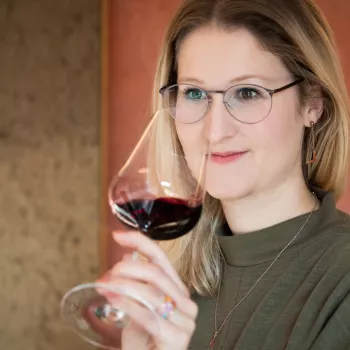
"I was fascinated by the fact that the white wine developed enormous potential through mash fermentation. The saltiness that is so characteristic of the Braunsberg has intensified."
Natural wines - by conviction
The time factor is a recurring theme throughout the 'Down to Earth' range, for example, in the longer maceration times. Michaela Riedmüller works hard to bring out the specific characteristics of each individual wine. She achieves this not least by using different vessels such as wooden or ceramic barrels and concrete eggs. "It's about tasting the diversity," she says. Broadening your horizons, experiencing what is possible – you can do this not only by travelling, but also with Riedmüller's wines. The 'Down to Earth' family, which now comprises seven wines, has also been constantly expanded:
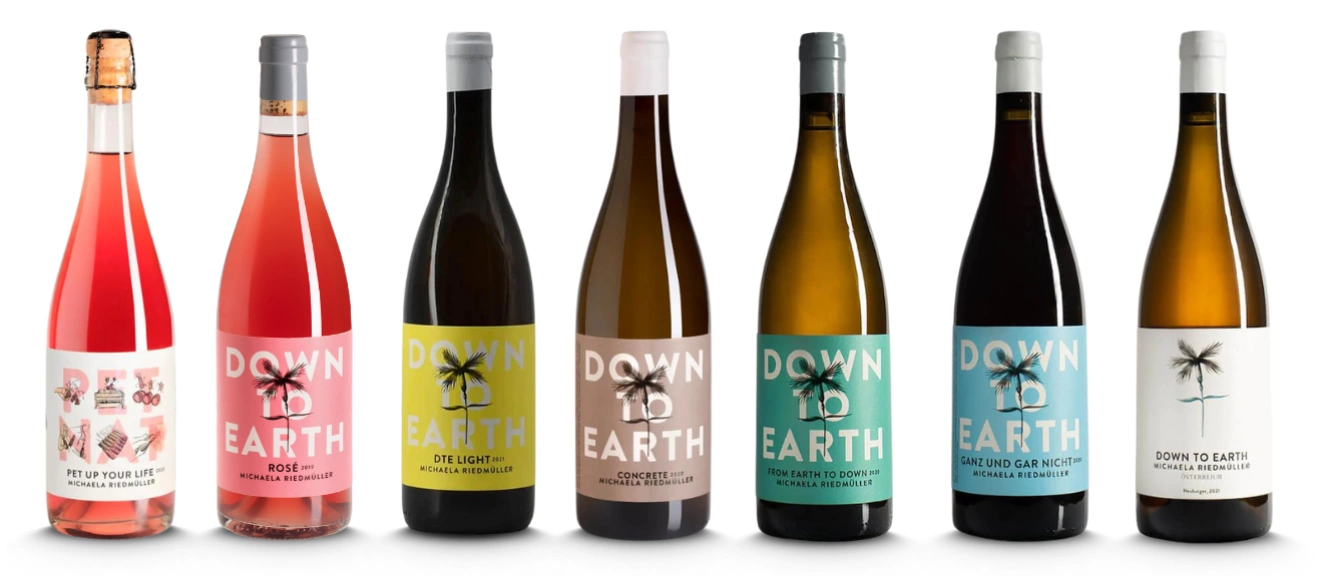
Pet up your Life
Fruit meets minerality: Michaela Riedmüller's Pétillant Naturel made from the Blaufränkisch and Muskateller grape varieties provides a natural sparkle in pink.
'Down to Earth' – Rosé
The Blaufränkisch grapes for this Rosé are spontaneously fermented and the wines are aged for eight months in large wooden barrels. Alcoholic and malolactic fermentation take place in the barrel and the Rosé is transferred to an egg-shaped barrel made of concrete for the finish. The result: a fresh, floral wine that is reminiscent of hibiscus and, according to Riedmüller, is "super earthy".
'DTE Light'
This fresh and lively cuvée of Welschriesling and Neuburger, which provides a firm structure, was on the skins for twelve days and fermented spontaneously. The wine gets its slightly smoky tannin from ageing in used red wine barrels. Sounds exciting? It is!
From Down to Earth, from Earth to Down
This cuvée from the Welschriesling and Neuburger grape varieties is described as a "fresh, multi-faceted natural wine" in the current Falstaff Wine Guide and awarded 93 out of 100 points. Fermented spontaneously after eight days on the skins and matured in used wood, minimally sulphurised and bottled unfiltered.
'Down to Earth' – Concrete
In South Africa, Michaela Riedmüller tasted a Chenin Blanc from a concrete egg and immediately decided: "I'm going to put a Welschriesling in there." No sooner said than done. The 'Concrete' matures for eight months in the Nomblot EGG, where it develops its "character". This is characterised by a delicate saltiness, mineral notes, a fine acidity and a balanced structure. The wine critics of À la Carte magazine awarded it 92 out of 100 points.
'Down to Earth' – Ganz und Gar nicht
For this "light red wine", as Michaela Riedmüller describes it, Blaufränkisch and Blauburger come together. The grapes were harvested early to preserve the lightness and acidity. The wine was removed from the skins during fermentation and continued its spontaneous alcoholic fermentation in used wooden barrels. "You should drink it chilled like a white wine, then the effervescence comes into its own," recommends Riedmüller.
'Down to Earth' – Neuburger from ceramic barrel
The grapes were fermented on the skins for two weeks to fully allow the aromas of the grape variety to unfold. Maturing in ceramic barrels allows the Neuburger to develop its characteristic varietal traits, presenting itself unfiltered, full-bodied and acidic. "And it has a very distinctive tea aroma," says Riedmüller. Gault&Millau awards it 17.5 out of 20 points.
Ried Braunsberg Blaufränkisch Carnuntum DAC
Harvested by hand and spontaneously fermented over two weeks in open vats, the single-vineyard Blaufränkisch then matures for more than a year in used 500-litre barrels. Michaela Riedmüller describes it as a "cool, spicy and velvety" variety that allows you to experience the Braunsberg sip by sip.
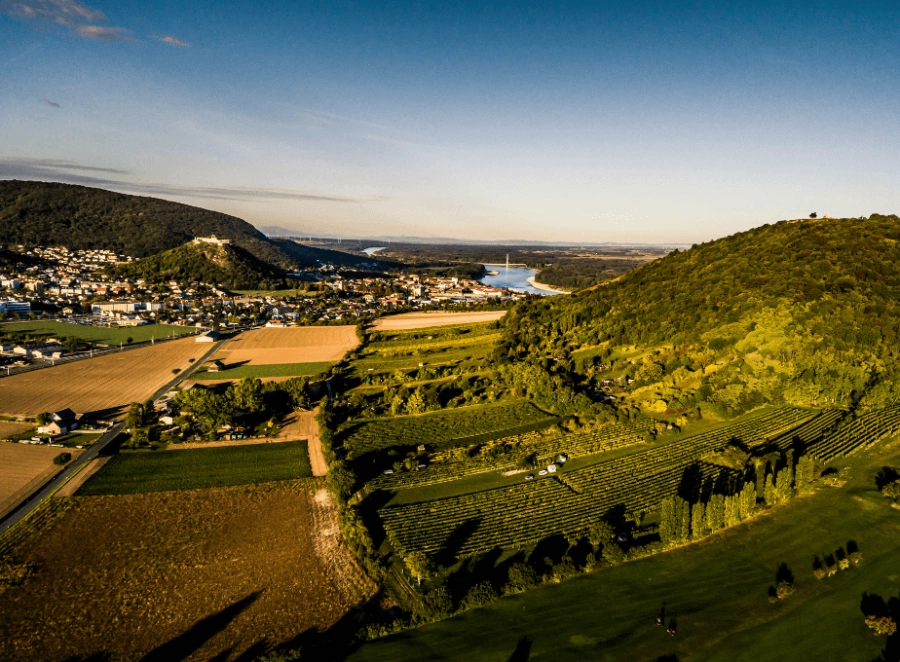
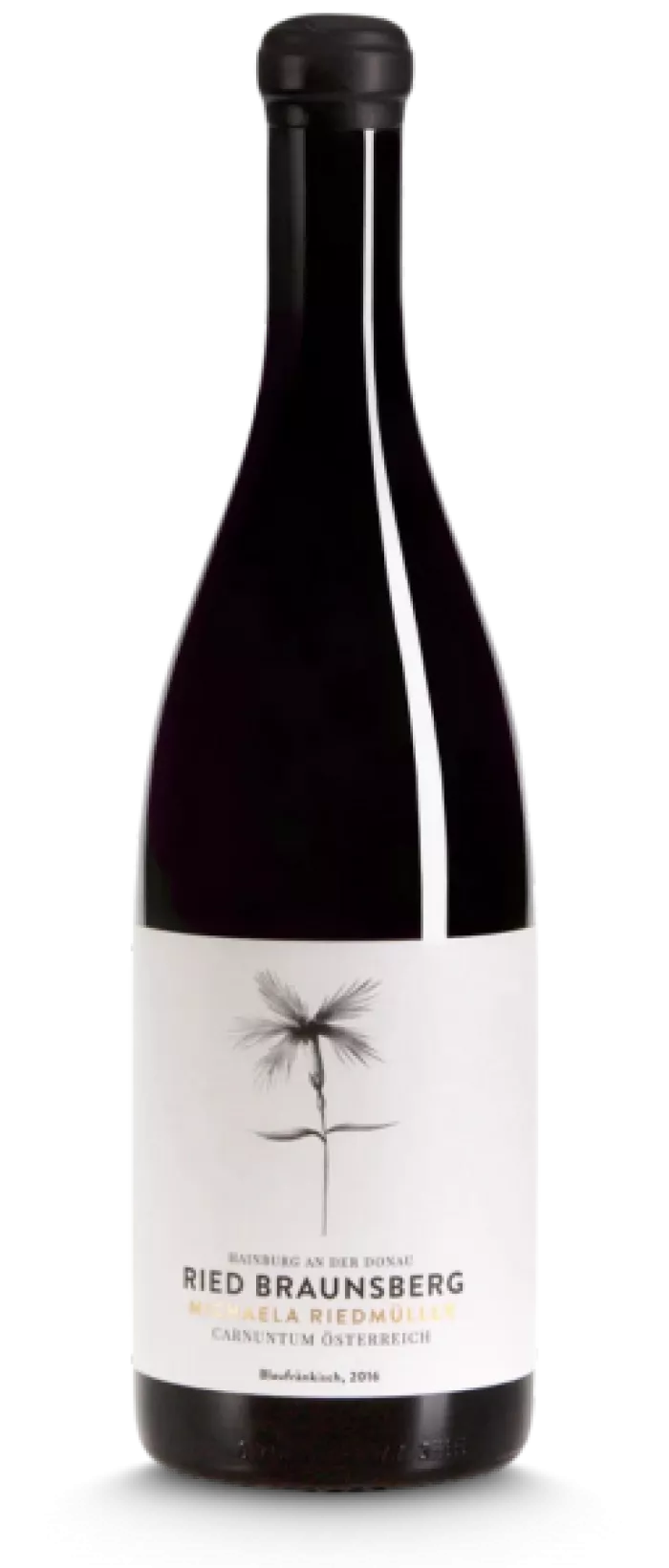
Challenging terroir
The Braunsberg rises almost 400 metres above the Danube river. Hainburg and its local mountain can look back on a long wine-growing tradition that dates back to the time of the Celts and Romans. However, the soil is not only steeped in history, but also extraordinary in a geological sense. The Braunsberg is part of the Little Carpathians and consists of hard granite and gneiss rock covered by a fine layer of weathered limestone chips.
This soil combined with a microclimate providing many hours of sunshine, warmth from the river valley, comparatively low rainfall and cooling winds that blow through the corridor between the Alps and the Carpathians, creates very special conditions for viticulture. And Michaela Riedmüller, who has Braunsberg in her DNA, knows how to make the most of them.
With nature
"It's about finding a balance," says the young winemaker about her work in the vineyard. Sustainability is a top priority for her - with measures such as gentle pruning, a deliberately higher wall of foliage to provide shade and the application of compost to ensure that the vines, which are an average of 35 years old, receive sufficient nutrients. Nature also has a solution for the plants' water supply: the lack of precipitation is compensated for by the humid Danube air.
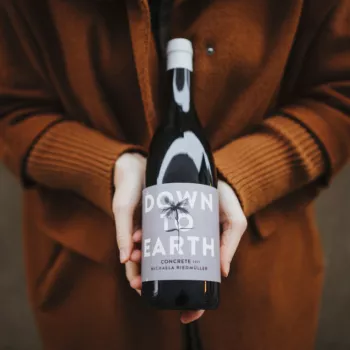
"I stand for straightforward wines that reflect the terroir of the Braunsberg with its saltiness and minerality."
Globetrotter
Even though Michaela Riedmüller "only" fills 30,000 bottles, she offers wine connoisseurs an enormous variety with her range. In addition to the 'Down to Earth' line, there are her award-winning Blaufränkisch wines from Braunsberg and Spitzerberg that she now exports to six countries: Germany, Denmark, Italy, England, Switzerland and the USA: And here, too, she already has her sights set on the next destinations: "I see a lot of potential for my wines in the Asian market in particular." During a trip to Bangkok, she uncovered a lively natural wine scene. "That really excites me!"
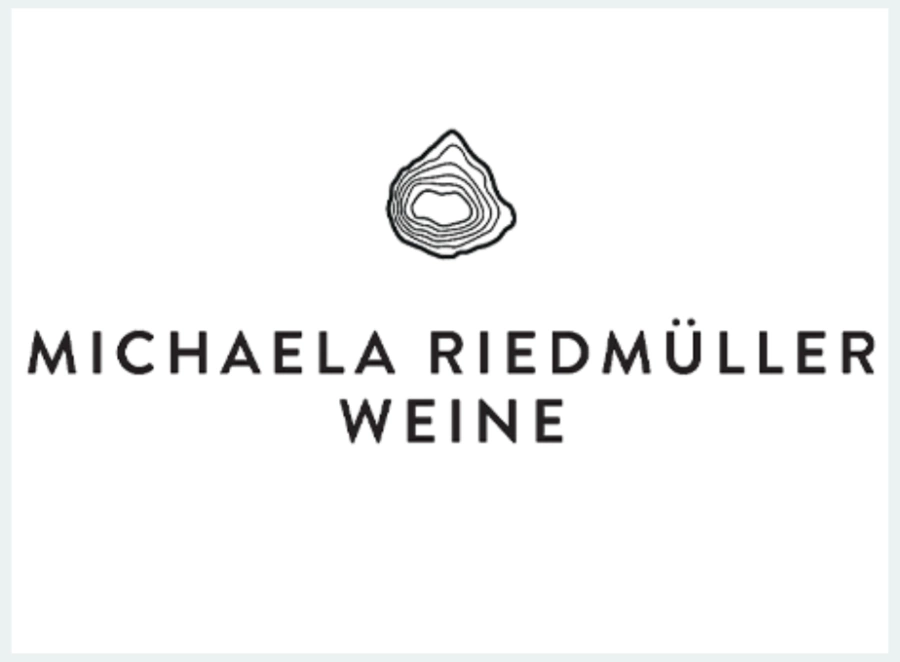
Michaela Riedmüller Winery
Klosterplatz 4
A – 2410 Hainburg an der Donau
Carnuntum
AUSTRIA
+43 699 150 169 10
[email protected]
www.michaelariedmueller.at














